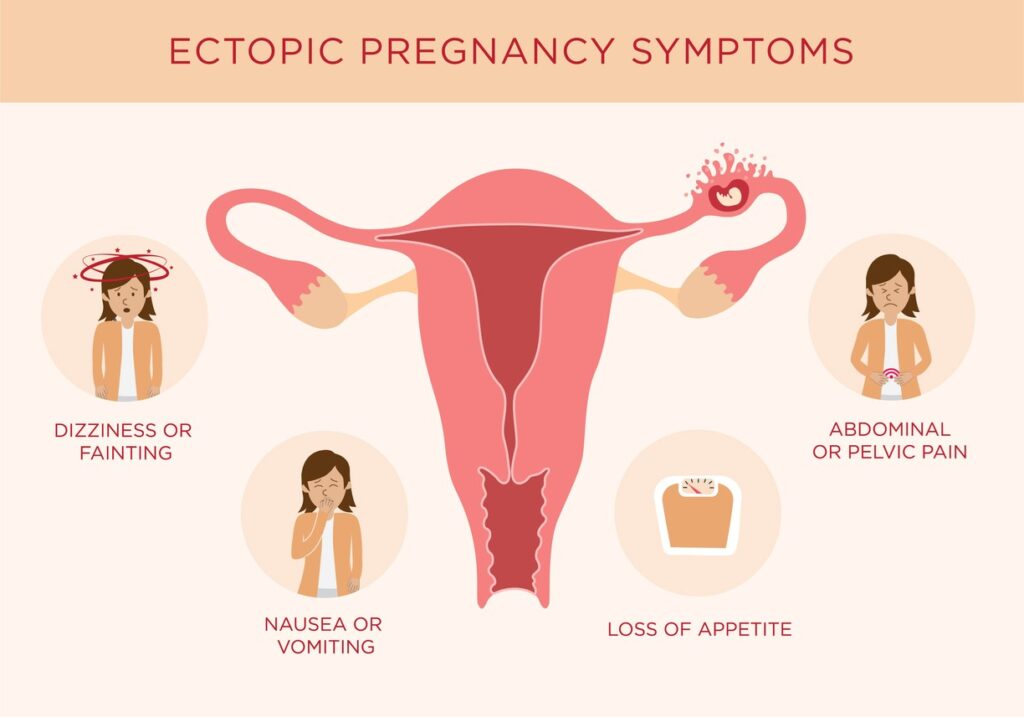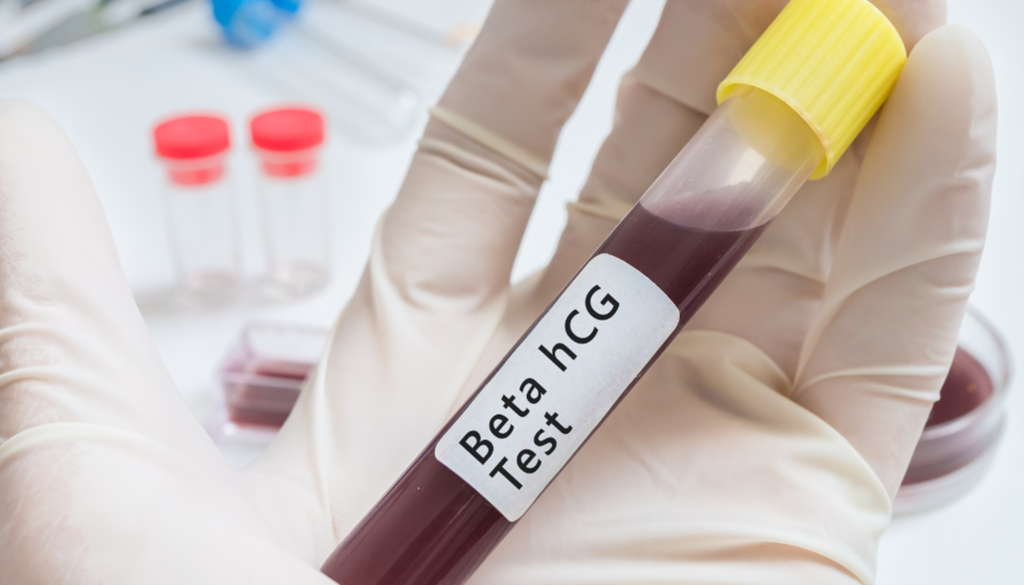What is an Ectopic Pregnancy?
Fertilization normally occurs in the fallopian tube, and then the smooth muscle contractions and the ciliary beat within the fallopian tubes assist the fertilized egg in its journey into the uterus. (Cilia are microscopic hair-like projections at the end of the fallopian tubes that beat rhythmically at a frequency of 3.46Hz as they sway!) In an ectopic pregnancy, the fertilized egg fails to implant in a normal position in the uterus where it can develop and thrive. Instead, the pregnancy attaches elsewhere in the reproductive system or body – usually in the fallopian tube. But an ectopic pregnancy can also implant near the ovaries, in a prior c-section scar inside the uterus, in the lower part of the cervix, or in the abdominal cavity. About 90% of all ectopic pregnancies occur in the fallopian tube.
In medical terms, “ectopic” refers to something that occurs abnormally. Ectopic pregnancy is rare and occur Ins in about 2 out of every 100 pregnancies.
With an ectopic pregnancy, there is no hope of a healthy birth. A fallopian tube cannot expand the same way a uterus can, and if left untreated, an ectopic pregnancy will grow too large, causing the fallopian tube to burst open. This rupture represents a life-threatening emergency for the mother, who could bleed to death within a few hours.
When an egg and sperm fertilize, part of that egg becomes the placenta, and the other part becomes the fetus. But when a fertilized egg implants in the fallopian tube, there is usually abnormal development, a mass of cells develops, and no fetus exists. In the rare situations of a detectable fetus, it is often abnormal because it does not have the usual blood flow, and there is no endometrium (the inner lining of the uterus) that supplies blood and nutrients to the fetus. Unfortunately, even if a normal fetus is detected, no medical technology can remove the placenta and the fetus and relocate it to the uterus. Once the placenta is disrupted, the pregnancy ends.

Symptoms of an Ectopic Pregnancy
Some early signs of an ectopic pregnancy include:
- Several lower pelvic (belly) or abdominal pain, especially on one side.
- Vaginal bleeding or spotting.
- Low back pain.
- Mild or moderate one-sided cramping of the pelvis.
As the ectopic pregnancy develops, more severe symptoms may develop. If any of these signs or symptoms occur while pregnant, seek emergency medical help immediately:
- Shoulder pain (caused by blood leaks from the fallopian tube),
- Sudden and severe pain in the abdomen or pelvis,
- Feeling very weak, dizzy, lightheaded, or fainting.
Early detection of an ectopic pregnancy offers more treatment options, and therefore it is important to report any abnormal bleeding or pelvic pain to an obstetrician immediately. A doctor will do an ultrasound, blood test, and pelvic exam to determine if there is an ectopic pregnancy. The evaluation includes:
- A blood test for a beta-hCG level (human chorionic gonadotropin is a hormone made by the placenta) to detect a pregnancy. With an ectopic pregnancy, these numbers rise differently from a healthy, normal pregnancy.
- An ultrasound scan is done to see if the pregnancy is implanted in the uterus. If no pregnancy is detected in the uterus, but hCG and Progesterone levels are rising, this indicates an ectopic pregnancy. An early pregnancy ultrasound is a good way of identifying an ectopic pregnancy.
- Pelvic exam.
Treatment of an Ectopic Pregnancy
An ectopic pregnancy can be treated with medication or surgery, depending on how far the pregnancy has progressed.
- Medication
Methotrexate, given by injection, is used to end an ectopic pregnancy if caught early. Depending on the hCG levels, one or two doses may be needed. When effective, this medication will cause symptoms that are similar to that of a miscarriage, such as cramping, bleeding, and the passing of tissue.
The woman will need to be monitored closely after receiving a methotrexate injection. The first checkup is usually 4 days after the first treatment and then again, 7 days later, to measure that the pregnancy hormones are coming down appropriately. Weekly checkups are needed until no hCG is found in the blood.
Methotrexate is a chemotherapy drug that stops cells from growing, and the body naturally absorbs the remaining cells over 4-6 weeks. Successful methotrexate treatment avoids surgery, and fallopian tube removal is avoided.
There are some foods that your doctor may advise you to avoid while undergoing methotrexate treatment:
- Alcohol
- Foods that contain folic acids, such as fortified cereals, enriched bread, peanuts, dark green leafy vegetables, orange juice, and beans.
- Ibuprofen
- Foods that produce gas because this could mask the pain of a possible tube rupture.
As with all medication, there are side effects. The most common side effects of taking methotrexate include cramping, dizziness, diarrhea, light sensitivity, injection site pain, redness or swelling, hair loss, mouth sores, nausea, and GI upset.
It is recommended that pregnancy should not be attempted for several months after taking methotrexate. Consult with your doctor before attempting another pregnancy.
- Surgery
Laparoscopic surgery removes an ectopic pregnancy from the fallopian tube or other abnormal location where it has been implanted. The patient will be under general anesthesia. If the ectopic pregnancy has implanted in the fallopian tube, that tube will most likely have to be removed. A damaged fallopian tube could result in a second ectopic pregnancy; therefore, a damaged tube is always removed. Open surgery through a larger cut may be needed if the ectopic pregnancy is in the abdomen.
After surgery, you can expect some bleeding for up to six weeks. In addition, here are some self-care suggestions:
- Do not lift anything heavier than 10 pounds.
- Drink plenty of fluids
- Refrain from sexual activity, tampon use, and douching.
- Rest as much as possible, especially for the first week.
If an ectopic pregnancy has ruptured, then surgery is always required.
Factors that increase the chance of having an ectopic pregnancy:
- Previous ectopic pregnancy.
- Certain sexually transmitted infections.
- Pelvic inflammatory disease – An infection of the uterus, fallopian tubes, and nearby pelvic structures.
- Smoking (the cilia beat frequency is reported to be negatively affected by smoking).
- Fertility treatments (risk factor changes from 1 or 2% of pregnancies to 2 to 5% if fertility treatment is involved).
- Previous fallopian tube surgery.
- Previous pelvic or abdominal surgery.
- Endometriosis – A condition in which tissue that lines the uterus is found outside of the uterus, usually on the ovaries, fallopian tubes, and other pelvic structures.
- Age older than 35 years.
How will I feel after the treatment?
Many women have the same feelings as those who experienced other kinds of pregnancy loss. Feelings of loss, disappointment, shock, fear, and grief are all normal emotions but, thankfully, tend to lessen over time. Any pregnancy loss is devastating. Going through an ectopic pregnancy can be emotionally and physically challenging.

For several weeks, you may feel tired while you recover. You may feel abdominal discomfort or pain during this time. It can take 4-6 weeks for the hCG levels in your body to drop to being undetected. During this time, you may continue to feel you are pregnant. Unfortunately, your periods may take a few cycles to return to normal.
A pregnancy after an ectopic pregnancy
Thankfully, most women with an ectopic pregnancy will have healthy pregnancies in the future. If one fallopian tube was removed due to the ectopic pregnancy, achieving another pregnancy may be more difficult, but it is still possible.
However, a woman who had an ectopic pregnancy is more likely to have a second one, and therefore, careful monitoring should occur once a pregnancy is achieved.
If you are looking for a published scientific article on this subject, we found this one to be informative: Ectopic Pregnancy by Tyler Mummert, David M. Gnugnoli, Updated August 8, 2022.
Author: Karen Synesiou, Infertility Portal, Inc.


